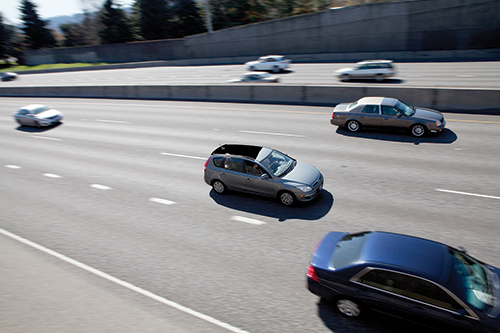The “Slower Traffic Keep Right” signs we see posted along our freeways may soon be more than just a good idea in Oregon—they might become law. If Oregon Sen. Ginny Burdick has her way, it will be illegal to drive in the left lane of the freeway unless you’re passing someone. Until very recently, I hadn’t given it much thought. Then I drove to California for spring break, and the proposal took on a whole different meaning.
Slower traffic— keep right

The “Slower Traffic Keep Right” signs we see posted along our freeways may soon be more than just a good idea in Oregon—they might become law. If Oregon Sen. Ginny Burdick has her way, it will be illegal to drive in the left lane of the freeway unless you’re passing someone. Until very recently, I hadn’t given it much thought. Then I drove to California for spring break, and the proposal took on a whole different meaning.
Let me explain.
Currently, on our freeways only campers, trailers and trucks are relegated to the right, slow lane—but Burdick thinks this law should apply to all cars to keep the flow of traffic seamless. According to a KPTV report, she is all too familiar with the dangers of people driving too slowly, having commuted from Salem to Portland for 16 years. I concur—my recent trip served to convince me.
Driving on endless stretches of freeway where the speed limit is 70 miles per hour in places, cruise control is where it’s at, and it feels great. Except, that is, when you’re coasting along and come upon dawdling, slower cars hanging out in both lanes.
I can’t count how many times I came across a huge 18-wheeler in the right lane and a Sunday driver in the left—and it wasn’t Sunday. The act of passing became more like an obstacle course, and slamming on the breaks while going full throttle was not only a waste of gas, it was bloody annoying.
So I was already feeling the beginnings of a road-rage headache when, in my rear-view mirror, I saw a flash of bright metal streaking up behind me. A Camaro was bearing down on me with the unmistakable rumblings of ridiculous amounts of horsepower. I kept my banged-up ’94 Toyota to the right but then noticed, a few feet behind me, a station wagon staying defiantly in the left lane, like she wanted to show the Camaro a thing or two.
As the Camaro thundered up and tried to pass, the station wagon sped up just enough to sit on my tail and block the Camaro. I could hear the mounting frustration in every rev behind me.
This went on for a good minute with the sports car weaving in and out of both lanes, trying to find a way through; meanwhile, I was sweating bullets, sure there would be an accident any minute. Finally, after what seemed like an eternity, the driver of the station wagon got bored with the game and let the Camaro through. Its driver gave a furious, one-fingered salute as she sped away.
If Burdick’s law passes, moves like that would go from stupid to illegal, and I think it’s about time. In other countries, however, this is old news. In Switzerland, for example, driving on the freeway is a relaxed, orderly experience, with hardly any of the bobbing and weaving we’re used to. Everyone drives in the right lane, passes on the left and moves straight back into the right. It’s a seamless affair—an organized system that makes sense for everyone.
Or take South Africa, where they go one better. The same rules apply for passing, but they also have a glorious system on two-lane highways: If a faster car comes up behind a slower one, the latter will ease over and drive in the wide shoulder, letting the other pass. Then, the faster driver flashes his hazard lights to say “thank you,” and the other responds “it’s a pleasure” with a flick of his high beams. How polite.
We may never get to that point, but Burdick is right to push for this law, and I, for one, hope it sails through. It will save gas, eliminate accidents and avoid the hair-pulling that many drivers resort to on their daily commutes.
Everyone will be on the same page—that is, the same lane—making for a more relaxed, organized drive with fewer instances of road-rage and a whole lot less bird-flipping.






